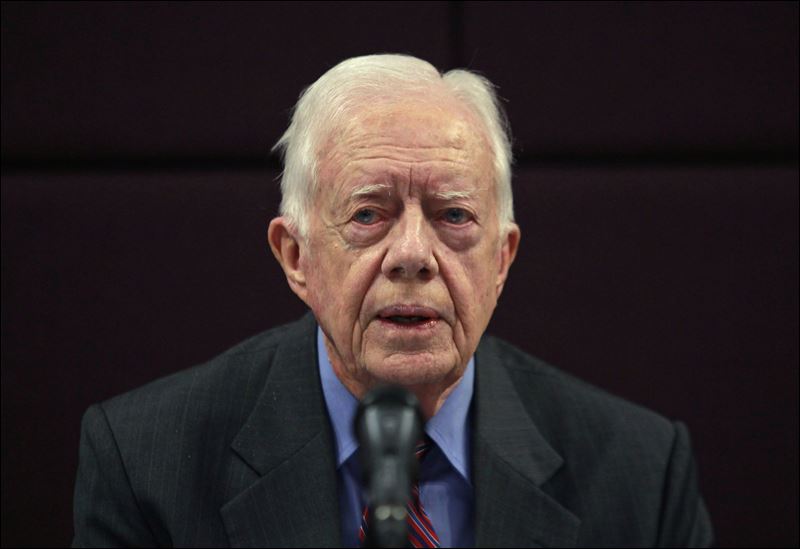By SHLOMO BEN-AMI
TEL AVIV – The late American diplomat George Ball once argued that Israel needed to be saved from its own suicidal policies “in spite of herself.” In a 1977 Foreign Affairs article, he called for an even-handed push by the United States for an Arab-Israeli peace. But, while Ball’s realistic position on the Israel-Palestine conflict is not uncommon among US State Department officials, it has remained off-limits for America’s political establishment, which has long upheld an almost sacred consensus on Israel – until now.
To be sure, to some extent, Ball’s position still represents a cry in the desert. After all, America has not wavered in its commitment to maintaining Israel’s “qualitative military edge.” In fact, US President Barack Obama’s administration has broken all historical records in its military aid to Israel, even as Israeli Prime Minister Binyamin Netanyahu has shown no willingness to use that US taxpayer-funded military edge to take calculated risks for peace. In this sense, the US is still underwriting Israel’s defiant annexationist policies.
But something is definitely different. Questions about Palestine are now highly polarized in American politics, with younger generations affected much more by images of an illiberal Israel tyrannizing a disenfranchised Palestinian nation than by the fading memory of the original Zionist epic. For them, the Israel-Palestine conflict has become a human-rights issue – and a highly contentious one at that. Israeli apologists are now facing pro-Palestine activism on university campuses on a level unseen in the US since students were protesting the Vietnam War.
A 2014 Gallup poll showed that, while a narrow majority of all Americans considered Israel’s 2014 assault on Gaza justified, only 25% of people under 30 did; 51% of people under 30 declared Israel’s actions to be unjustified. According to a 2014 Brookings Institution poll, a massive 84% of Democrats and 60% of Republicans would favor a one-state solution, in which a single democratic government guarantees equal rights for all citizens, Israeli and Palestinian. A December 2015 poll by the same organization indicated that 66% of Americans support a more evenhanded US policy in the Israel-Palestine conflict; among Democrats under 35, that proportion rose to 80%.
US politicians are paying attention. In recent months, Democratic lawmakers, headed by Senator Patrick Leahy of Vermont, have called for an investigation into Israel’s “gross violations of human rights,” including torture and extrajudicial executions, against Palestinians. And Dan Shapiro, the US ambassador in Israel, lit up the Israeli establishment last January, when he suggested in a speech that Israel is essentially implementing apartheid in the West Bank.
Senator Bernie Sanders, in his US presidential campaign, broke the mold when he called for revising the Democratic Party’s position on the Israel-Palestine conflict. In emphasizing the Palestinians’ plight, Sanders has highlighted not only his own morality-focused worldview – one that can tip into idealism, to be sure – but also his understanding of the mood of an important constituency. Thanks to his efforts, the Democrats’ convention later this month is set to mark a turning point for the party’s approach to the issue.
The Republican Party is also threatening to turn against Israel, but in a much more damaging way. Donald Trump, the party’s presumptive nominee for the presidential election in November, has indicated that he would not endorse America’s automatic support for Israel, hinting that he thinks Israel holds more responsibility in the failure of the two-state solution. Instead, he would be, he says,“a sort of neutral guy” in the Israel-Palestine conflict.
This seems to go over well with his supporters, many of whom like Trump for his anti-establishment approach. If the establishment politicians they despise support Israel, the logic goes, there must be something wrong with that policy.
The danger lies in the fact that Trump has tapped into an overtly xenophobic element of the conservative voter base. Indeed, he has been endorsed by white supremacists, including former Ku Klux Klan leader David Duke. Given this, Trump’s rise is very bad news for American Jews – and, indeed, all of America’s minority groups. Making matters worse, Trump’s impact may even extend beyond the US, with far-right leaders elsewhere, such as Austria’s Norbert Hofer, emulating his tactics to stoke and capitalize on atavistic nativism.
For Israel, a Trump presidency would clearly be a major loss, not least because Israel has long counted on Republican lawmakers to push its agenda. In 2011, for example, Republicans went so far as to arrange, without informing the White House, for Netanyahu to address Congress, in an effort to block the nuclear deal Obama had long been negotiating with Iran.
But the problem extends further than that. A less obliging ally in the White House is one thing; having Trump there, implementing his “America First” foreign-policy philosophy, is something else altogether.
While the idea of placing the highest priority on the interests of one’s own country is not in itself unreasonable, Trump’s particular discourse echoes the calls issued by isolationist, anti-Semitic groups prior to World War II for the US to appease Hitler. To Trump and millions of his supporters, “America First” means the end of America’s enlightened global mission. Foreign powers, whoever they are, should pay for America’s services.
By ignoring the outcry of European public opinion against its Palestine policy, Israel’s government has definitively lost the support of Europe. Now, its once-impregnable citadel in America is under threat. Surely it must realize that ignoring this challenge would amount to walking off a cliff.











